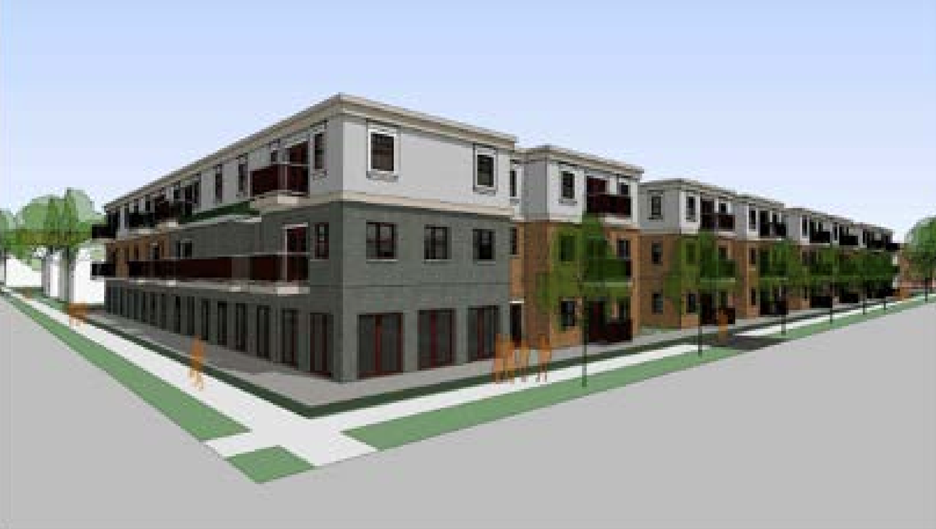Top-Level Takeaways
-
Federal stimulus payments and unemployment checks have boosted assets at ELGA Credit Union, but lending and investment is crucial to the community&s recovery.
-
An ELGA branch in downtown Flint occupies retail space that had been abandoned for more than 20 years. The commercial complex was an integral part of the revived business district.
In the early months of COVID-19,ELGA Credit Union($1.15B, Burton, MI) became one of the first local financial institutions to reopen its branch lobbies in and around Flint, MI. Soon, the credit union was adding 1,000 new accounts a month, and that growth trajectory has continued through today as new business has spread by word of mouth.
Assets for ELGA grew from $700 million as of March 31, 2019, to $1.1 billion as of June 30, 2021. Federal stimulus payments and unemployment checks have boosted assets at the cooperative, but ELGA knows lending is crucial to the recovery. As such, its $800 million loan portfolio comprises thousands of consumer loans, used car loans, mortgages, and business loans.

“We are focused not just on large-dollar business deals but on small-dollar loans for small businesses that are trying either to start up or to expand their business,” says Terry Katzur, executive vice president of ELGA Credit Union.
ELGA has been going against the grain of industry trends for years, focusing on serving moderate to low-income members of the community largely cut off from traditional financial services. Whereas other institutions have closed branches, ELGA has opened three new branches since 2019. In addition to a branch in downtown Flint, it placed branches in the nearby rural communities of Linden and Holly, both areas essentially abandoned by bank closures. And as others prioritize work-from-home options, ELGA is building a new 64,000-square-foot headquarters on the outskirts of Flint.
ELGA has supported low- to moderate-income communities for decades, providing an alternative to banks and building a reputation of approving loans with no minimum credit score. One factor that helped ELGA lay the foundation for growth came in 2017, when the credit union became a certified Community Development Financial Institution (CDFI). ELGA soon received its first CDFI grant for $776,500, which it used to fund potential loan losses and help fuel loan growth.
“The standard for CDFI is to leverage each dollar of those funds 10 times within a three-year period,” Katzur says. “We leveraged the funds 1,000 times over that period. We had good performance in getting those funds out, which helped to further offset the risk but at the same time allowed us to ramp-up and deploy more funds.”
The value of CDFI became crystal clear in 2020, as the pandemic depressed local economies that were already economically challenged. ELGA received a $1.8 million grant from the CDFI Rapid Response Program and plans to deploy all of those funds, Katzur says.
Katzur, who will succeed long-time CEO Karen Church after her retirement in February 2022, has seen many changes in the community since joining the credit union 26 years ago as a teller. To address those changes, ELGA focuses its lending on several major areas of community concern: transportation, small businesses, affordable housing, and community revitalization.
Auto Lending
Auto loans, particularly used car loans, are helping members increase mobility in both urban and rural areas.
“Some of these areas don’t have good grocery stores nearby, so people need to be able to drive to get healthy food,” Katzur says. “People need to get to their doctor. They need to get their kids to the doctor and to school. There are many things that make affordable transportation important, so it’s a huge focus of ours.”
In addition to direct auto lending, ELGA does $150 million in indirect lending; however, up to 60% of borrowers in a typical month are existing members, and most of the new members fall within ELGAs target market in Flint and surrounding Genesee, Lapeer, and Saginaw counties.
ELGA also provides members an alternative to payday lenders with its $1,000 consumer loans with no credit check. Other area credit unions offer a similar loan.
“Maybe it’s not all that unique anymore, at least not in our area, but it’s a great example of where the collective of credit unions becomes so much stronger when we work together,” Katzur says.
ELGA gave its lending program a boost early this year when it launched pre-approved loans. It has sent pre-approved offers to members through online, mobile, direct mail, and email channels, and, so far, members have responded swiftly.
“It’s been a bit of a game-changer for our lending programs,” Katzur says. “With pre-approved offers, we’re making sure members know they have options. People might have lower income or credit challenges and feel they’ll be declined, so what’s the point in trying? When they can click a button online to see their offers, that takes away a lot of anxiety.”
Affordable Housing
As in other parts of the country, affordable housing is a major issue in ELGA’s market. Flint, first home to General Motors, was hard hit by plant closings decades ago. The shrinking population and economy have left large numbers of abandoned homes and buildings around the city and few new investments coming into those neighborhoods.
To help address the need for more multi-family apartments and revitalize blighted areas of Flint, ELGA is partnering with nonprofits to provide funding for community housing developments and refurbishment projects.
In fact, ELGA’s branch on Saginaw Street in downtown Flint, which opened in 2019, occupies retail space that had been abandoned for more than 20 years. The commercial complex was an integral part of the revived business district by the city’s Uptown Reinvestment Corp., which leases the space to the credit union.
Since then, ELGA has provided financing to convert an abandoned school and an old apartment complex to modern mixed-use developments, with businesses on the street level and affordable housing above. One of ELGA’s key partners is Communities First Inc., and so far the two have teamed up to preserve and create more than 200 affordable housing units. Other collaborations include the summertime Movies Under the Stars program and financial literacy services to thousands of Flint families and residents.
“Our approach is to be very connected to the residents we serve and empower them in voicing what they want and need,” says Glenn Wilson, president and CEO at Communities First. “It’s only through great relationships with community-oriented partners like ELGA Credit Union that we can do the work we do.”

Still in the planning stage is an estimated $14 million new mixed-use, mixed income structure called The Grand on University, which will include one-, two-, and three-bedroom units. The property used to be the site of a grocery store that was torn down, leaving a parking lot and concrete pad.
“It’s going to be a significant project for that area,” Katzur says.
The Future
Another major building project in ELGA’s future is its new administrative offices in Grand Blanc Township, next to its newest branch. The new headquarters will be nearly three times the size of the current one and include a window view from any location. Although ELGA shifted to remote and hybrid work during the pandemic, Katzur says the administrative building still has an important role to play.
“People will want to come in to a great work environment,” Katzur says. “Even if it’s not all the time.”
Underlying ELGA’s growth program are strong financials. With a 12-month share growth of 20.3% and loan growth of 10.9%, ELGA’s return on assets was 1.78% as of June 30, 2021, and hovered just under 2.40% in 2019.
Katzur says that success comes from many years of experience in lending to low to moderate income borrowers. To be effective, lenders need to look beyond credit scores and debt-to-income ratios when making decisions.
“You have to dig in and understand whats going on in people’s lives to come up with solutions that work for them and also work for the credit union,” he says. “Its rewarding to help people that others don’t take a second look at.”
One of reasons ELGA applied for CDFI certification in 2017 was because of a big nationwide push to add more credit unions to the program. Although the CDFI grants have served as a good financial backstop to offset losses, Katzur says, one of the main benefits of the program has been keeping the credit union focused on its mission.
“It’s a psychological thing within the credit union,” Katzur says. “Knowing we’re a CDFI and getting grant money to do this, we need to make sure we’re doing it day in and day out.”